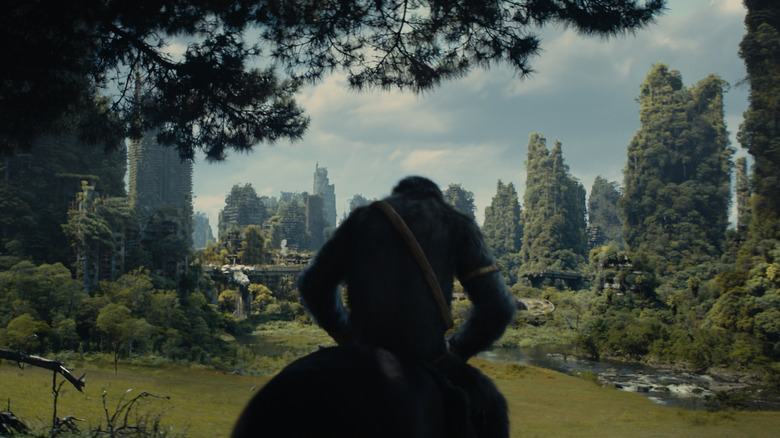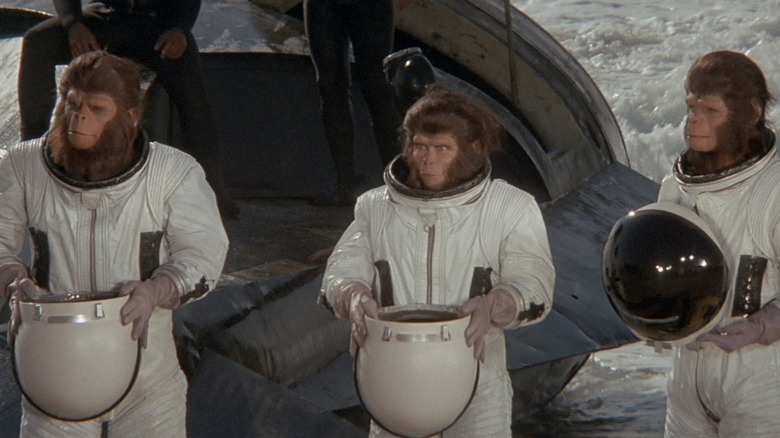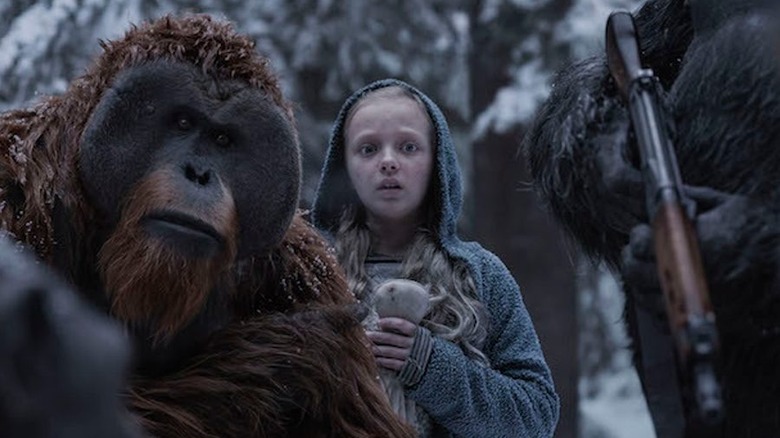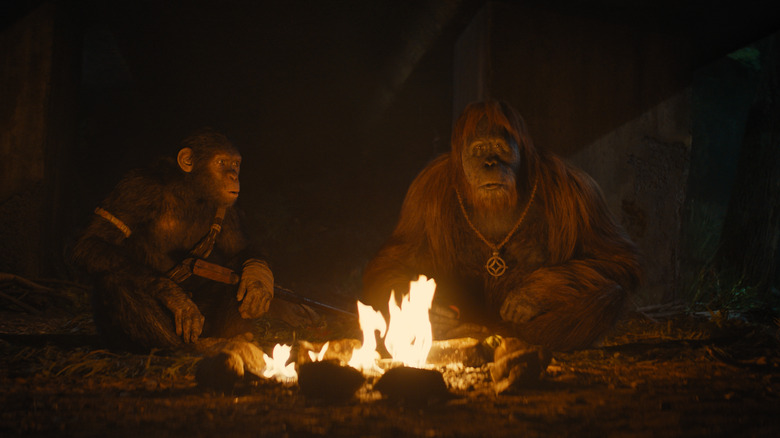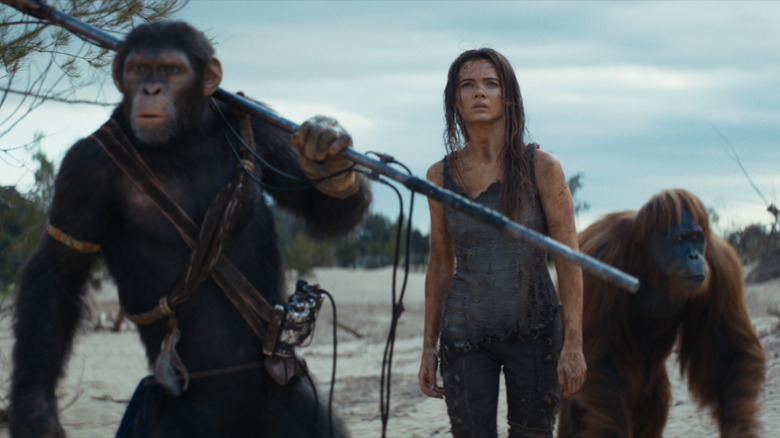When Does Kingdom Of The Planet Of The Apes Take Place On The Franchise Timeline? It's A Complicated Question
This article contains spoilers for "Kingdom of the Planet of the Apes."
In 1968's "Planet of the Apes," astronaut George Taylor (Charlton Heston) and his companions find themselves traveling from 1972 to the year 3978 during their voyage, initially assuming they've traveled through space as well as time. Famously, Taylor finds this assumption woefully incorrect, discovering that a malfunctioning spacecraft took him right back to his point of origin: an Earth, but 2,006 years in the future, where humanity has all but destroyed itself with nuclear war, and a race of sentient apes have risen to become the world's dominant species.
While that original film has arguably been surpassed in quality by its subsequent sequels and the modern reboot saga, its cultural impact cannot be matched; everything from its visual iconography and immortal twist ending is firmly ingrained within pop culture. That's a big reason why the "Planet of the Apes" films, even and especially the modern series that began in 2011 with "Rise of the Planet of the Apes," feel beholden to the original '68 feature, to the point where it's not been entirely certain if the modern saga assumes the original movie to be canon or not.
With the release of this month's latest entry in the "Apes" reboot series, "Kingdom of the Planet of the Apes," a good deal more has become clear: these new "Apes" films are forging their own path forward, with the general narrative of the original "Planet of the Apes" still a possibility in the future, albeit not in the exact same fashion as the 1968 film. However, with answers come more questions, and as "Kingdom" more firmly establishes a new timeline, it leaves one wondering not so much when we'll get to the "Planet of the Apes," but if and how.
The closed loop (or not) of the original Apes timeline
The shenanigans involving the timeline of the "Apes" began with the original quintet of "Planet of the Apes" films. After all, that iconic twist ending of the '68 film was initially intended to be the final word on "Apes," and a sequel was made largely due to studio 20th Century-Fox needing a hit after a series of box-office failures. Luckily, screenwriter Paul Dehn was able to take the numerous behind-the-scenes woes facing "Beneath the Planet of the Apes" and spin them into what ends up being a remarkably bold sequel. Even then, there's a sense that the series only barely escapes going too far off the rails, as Dehn opts to literally take the nuclear option during the film's finale, blowing up the planet for good.
The next film, "Escape From the Planet of the Apes," didn't seek to retcon or reset the timeline so much as reverse the premise of the original film, wherein a few apes from the future manage to travel back in time to the early 1970s. The clever twist hinted at by such a premise comes to fruition in "Conquest of the Planet of the Apes," revealing that the society of sentient apes supplanting humanity was begun thanks to the incursion of apes from the future. As the "Apes" films were being made one at a time, with no specific source material or outline to follow, some continuity inconsistencies occurred; the biggest difference is how, in "Beneath," it's said that the ape to begin the species' revolt against humans was named Aldo, whereas in "Conquest," it's actually Caesar (played by Roddy McDowall) who incites the revolution, with Aldo (Claude Akins) appearing in the next film, "Battle for the Planet of the Apes" in a different capacity.
However, Dehn and the series' various filmmakers seem to make these differences a feature, not a bug, implying that the "Apes" timeline is both rigid and malleable. In other words, it's fated that the apes will rise and humanity will fall, but the differences in the details on how that occurs provide a glimmer of hope that the Earth may not necessarily be doomed, as "Beneath" initially promises.
The Caesar trilogy's open-ended approach
After the poor reception for 2001's "Planet of the Apes" remake made it the franchise's only orphaned entry (with its own timeline being very much up for debate), "Rise of the Planet of the Apes" rebooted the series by taking things back to the very beginning and providing a brand new storyline for how sentient apes will one day take over the planet with the tale of Caesar (Andy Serkis), born in a lab and exposed to an intelligence-enhancing drug. "Rise" and its sequels, "Dawn of the Planet of the Apes" and "War for the Planet of the Apes," never at any point indicate that the original films are intended to be part of the canon of these movies; after all, the very different events involving a new Caesar leading an ape community emerging into dominance over dwindling humanity is more than enough evidence for that.
However, the films do allow for the possibility for the timeline to continue on its present course and end up at a mostly similar version of the events of "Planet of the Apes." "War" especially lays this out, as several "loose ends" ("loose" insofar as setting up the world for the assumed impending arrival of George Taylor) are tied up. For one, the virus that initially wiped out large swathes of the human population mutates, leaving affected humans mute and with decreased intelligence, like the mute, simple humans of the original "Apes." For another, one of these affected humans, a young girl (Amiah Miller), befriends Caesar and a few other apes, and based on her affinity for an old automobile decal, they decide to name her "Nova," the name of the (mostly) mute woman who befriends Taylor in the original film (played by Linda Harrison). Finally, there's the naming of Caesar's youngest son (born during "Dawn"): Cornelius (Devyn Dalton), implying he'll grow up to be a version of the ape from the original film.
The only indication that the "Planet of the Apes" future is a long way off comes from how short the timeline is for the Caesar trilogy. "Rise" ostensibly takes place in 2011, "Dawn" a decade later, and "War" just two years after "Dawn," meaning Caesar dies sometime last year, in 2023.
Just when does Kingdom of the Planet of the Apes take place?
Part of the way "Kingdom" operates lies in the various assumptions it knows people have made or could make about when it takes place. Of course, this is all due to the narrative trick it's pulling: a twist ending. Not only is that totally in line with the series, it also wasn't really utilized during the Caesar trilogy. The sleight-of-hand begins right at the top, with the film opening with Caesar's funeral just moments following the close of "War," before jumping far forward in time, as an on-screen title says "Many Generations Later." While the initial assumption is that we might be seeing Earth hundreds of years after Caesar's demise, one should remember that the average lifespan of, say, a chimpanzee is about 39 years, according to Google. Yet perhaps the drug that changed the apes has altered their chemistry further.
In any case, it's safe to assume that "Kingdom" is set at least a couple hundred years after "War" (this Empire article says it's around 300 years), in the 2300's. Initially, "Kingdom" seems well on its way to becoming the "Planet of the Apes" future, with the apes of the world having generally adopted things like vocal speech (as opposed to sign language) and basic civilization. With the small remaining human population being completely mute and enslaved, it seems at first that the only aspect left to come is the apes coalescing under one body of government. It's that issue that lies at the heart of "Kingdom," with the megalomaniacal Proximus Caesar (Kevin Durand) aggressively decimating and assimilating separate ape societies to build his own kingdom.
How Kingdom moves the goalposts for the Apes timeline
Yet the "planet of the apes" won't be established quite so fast, as the rest of "Kingdom" demonstrates. For one thing, the apes eventually refuse to submit to Proximus' rule thanks to Noa (Owen Teague), who chooses to study the teachings of the old, deceased Caesar (whose son, Cornelius, is nowhere to be seen yet). For another, it turns out that not all humans have lost their speech and higher thinking; Mae (Freya Allan), who is initially named "Nova" by Caesar scholar Raka (Peter Macon), is actually a scout for a tribe of still-healthy humans surviving in an old military bunker, and the finale of the film sees these humans make contact with others across the globe.
As Mae's deadly disagreement with the willing ape collaborator Trevathan (William H. Macy) implies, perhaps not all the remaining healthy humans will get along, and a nuclear war could still be in store. Even though Noa and Mae are briefly friends, Noa begins to believe that no humans are to be trusted given their tendencies toward dominance and self-preservation, which could lead to general ape enmity toward the species once Taylor (or someone else stranded on the spacecraft launched near the end of "Rise") shows up.
Thanks to "Kingdom" being touted as the first of a new trilogy, it can be assumed that the "Planet of the Apes" future won't get here for at least one more film, and maybe even two, if the plan is to spend a trilogy building toward ape overlords taking over after humanity's final gasp. If there's one thing the "Apes" franchise can teach us, it's that when it comes to the future, all bets are off.
